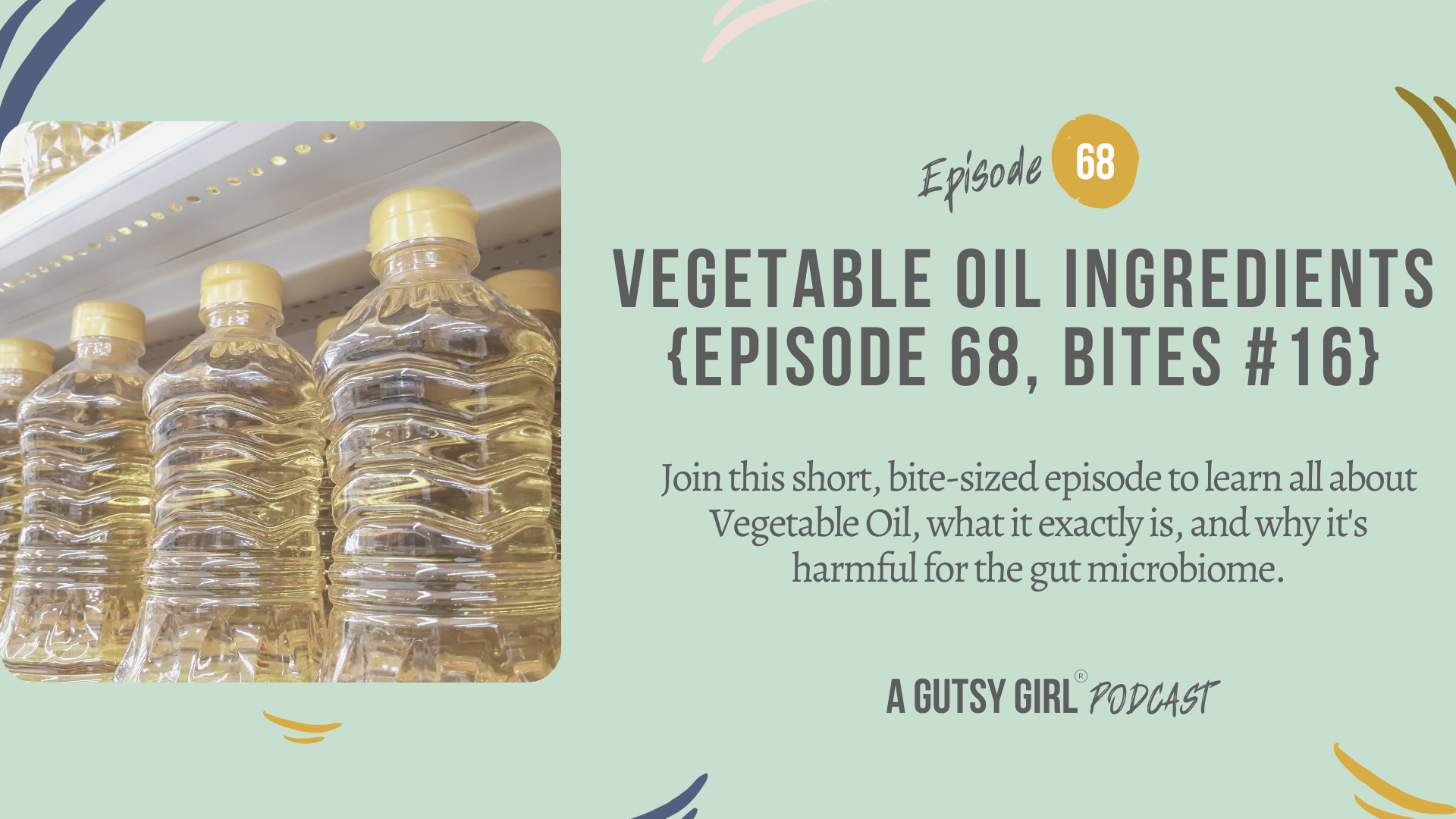Can acid reflux cause sinus problems? And is there a gut-sinus connection?
We know that a healthy microbiome supports the epithelial barrier in both the sinuses and the gut – the bodies first line of defense to prevent environmental and food-borne toxins from reaching the blood stream.
We don’t often consider the fact that normal nasal drainage delivers sinus flora into the stomach and small intestine, so supporting healthy sinus flora is desirable for a variety of reasons.
Today we are exploring the gut-sinus connection, and the best way to keep your sinuses flourishing.
Can Acid Reflux Cause Sinus Problems {+ 4 more gut-sinus connections}
Click HERE to save this post on ‘can acid reflux cause sinus problems’ for later.
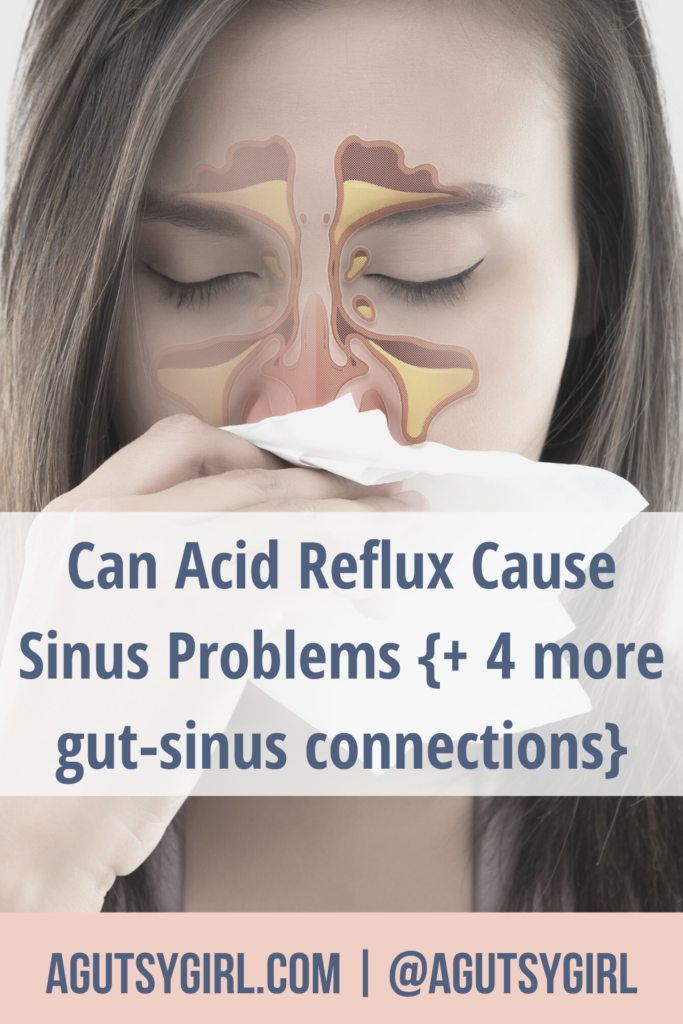
Before we specifically address the reflux-sinus connection, let’s explore more on sinus, and then sinus as it relates to the gut.
What are the Sinuses?
According to the Cleveland Clinic,
The sinuses are four paired cavities (spaces) in the head. They are connected by narrow channels. The sinuses make thin mucus that drains out of the channels of the nose. This drainage helps keep the nose clean and free of bacteria.
Chronic sinusitis (CRS) is very common. The CDC estimates that 28.9 million adult patients have been diagnosed with it.
Common symptoms of CRS (according to the Mayo Clinic) include:
- Nasal cavity inflammation
- Thick, discolored discharge from the nose (runny nose)
- Drainage down the back of the throat (post-nasal drip)
- Blocked or stuffy nose causing difficulty breathing through your nose
- Pain, tenderness and swelling around your eyes, cheeks, nose or forehead
- Reduced sense of smell and taste
- Ear pain
- Headache
- Aching in your upper jaw and teeth
- Cough or throat clearing
- Sore throat
- Bad breath
- Fatigue
4 Different Ways There is a Gut-Sinus Connection
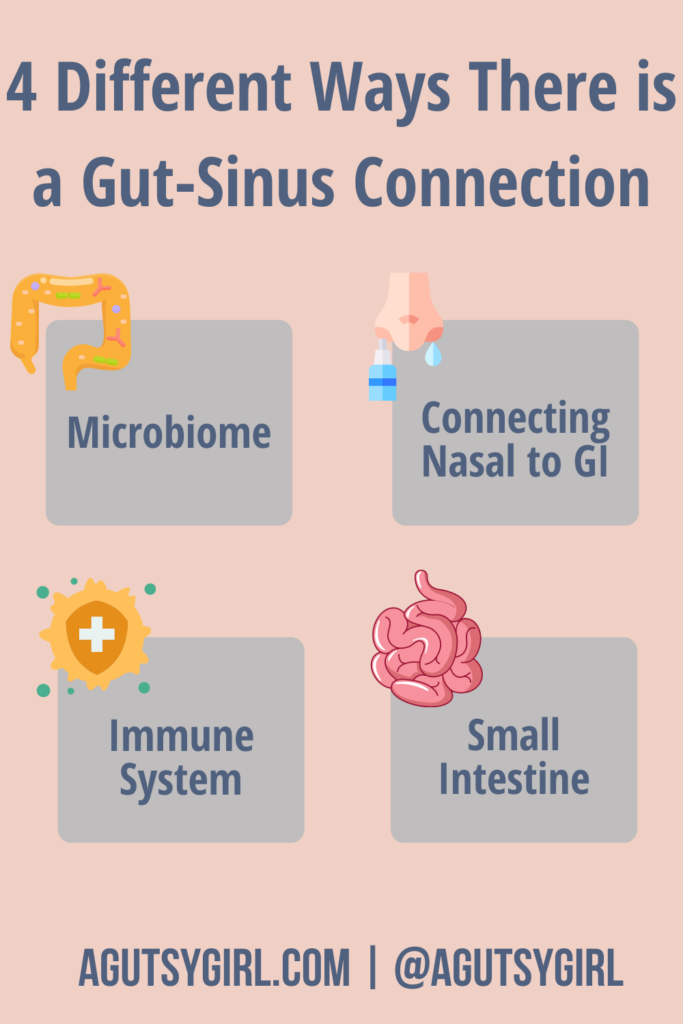
1. Microbiome
As with the gut microbiome, there is also a nasal microbiome.
Functional or compositional perturbations of the microbiome can occur at different body sites and this dysbiosis has been linked with various diseases; for example, inflammatory bowel disease and metabolic disorders have been linked to dysbiosis in the microbiome of the gastrointestinal tract and URT (Upper Respiratory Tract) infections (URTI, such as chronic rhinosinusitis [CRS]) with dysbiosis in the URT. (source)
2. Connecting Nasal to GI
As the nasal cavity is in constant contact with the external environment, it acts as a physical transition forming an interface between the external environment and the lower respiratory and gastrointestinal tract. (source)
3. Immune System
Remember, how many times you’ve seen this….70-80% of the immune cells lie within the gut? So, if your immune system is weakened and the gut is predominantly “bad” bacteria, you are far more susceptible to any and all viruses and bacterial infections and overgrowths.
4. Small Intestine
According to Zach Bush MD, “Dysbiosis, chronic inflammation, and mucous production in the sinuses leads to neuro and immune system stress and can contribute to the post nasal drainage delivery of sinus flora into the stomach and small intestine resulting in small bowel overgrowth of non-intestinal bacterial and fungal elements.”
There is obviously a clear connection between what happens in our sinuses and the gut microbiome.
So let’s now talk about one of these direct connections.
Sinus Symptoms + Symptoms of Acid Reflux
Above is a list of symptoms you may experience with chronic sinus infections.
I have a post all about reflux (HERE). Among many other things I share in the post, here is a list of some common acid reflux symptoms:
- prolonged sore throat, throat irritation, and/or hoarse voice
- bad taste in the mouth
- heartburn, burning sensation and pain in the upper abdomen (can be so severe that it’s mistaken for a heart attack)
- sensation of a lump in the throat
- difficulty swallowing and/or painful swallowing
- disrupted sleep
- vomit that looks like coffee grounds and/or contains blood
Remember just because you have acid reflux doesn’t mean you are (necessarily) a GERD patient. GERD stands for gastro-esophageal reflux disease, and it is when acid reflux progresses to chronic acid reflux. Further symptoms of GERD include the feeling of a lump in the back of your throat.
Now, here’s where it gets tricky with acid reflux symptoms — sometimes there are no symptoms, but it’s still occurring. This is silent reflux . It’s “silent” in the sense that the cause/effect is there, but you don’t show symptoms.
We also refer to silent reflux as Laryngo-pharyngeal Reflux (LPR).
Symptoms of LPR (laryngopharyngeal reflux)
So, even though you don’t show any severe symptoms, you might present with the following mild symptoms:
- hoarseness
- sore or burning throat
- trouble swallowing
- frequent throat clearing
For both reflux and sinus problems, here are 2 lifestyle factors to consider:
- Spicy foods. They might clear up the sinuses, but can make reflux worse.
- Weight loss. IF you need to, this can help with both reflux and sinus or respiratory problems in general.
Now that we have taken all of the above symptoms and information on reflux and sinus into consideration the question still remains: Can acid reflux cause sinus problems?
Here’s what the research says:
- Two European studies found that the SNOT (Sino-Nasal Outcome Test) score significantly increased among patients with GERD, suggesting a direct role of GERD in the development of chronic rhinosinusitis. (source)
- Ears, nose, and throat manifestations as a result of GERD symptoms. (source)
But also, even though some studies say the correlation isn’t super strong (maybe more coincidental?) because they have some symptom overlap, we can still conclude that getting to the root of one problem might also clear up the other.
In other words, if you make the necessary lifestyle changes for the acid reflux and/or address the physical causes contributing to the pain, both the reflux and sinus problem might clear. And also, vice versa.
If you’re having sinus passages issues, here is more information.
The Sinus Solution
Nasal saline is one of the common recommendations for clearing any nasal obstruction .
However, Mount Sinai states,
Be careful with use of over-the-counter spray nasal decongestants such as oxymetazoline (Afrin) or neosynephrine. They may help at first, but using them for more than 3 to 5 days can make nasal stuffiness worse and lead to dependence.
And this is where ION* Sinus Support (Intelligence of Nature) can come into action as a superior alternative to generic nasal sprays.
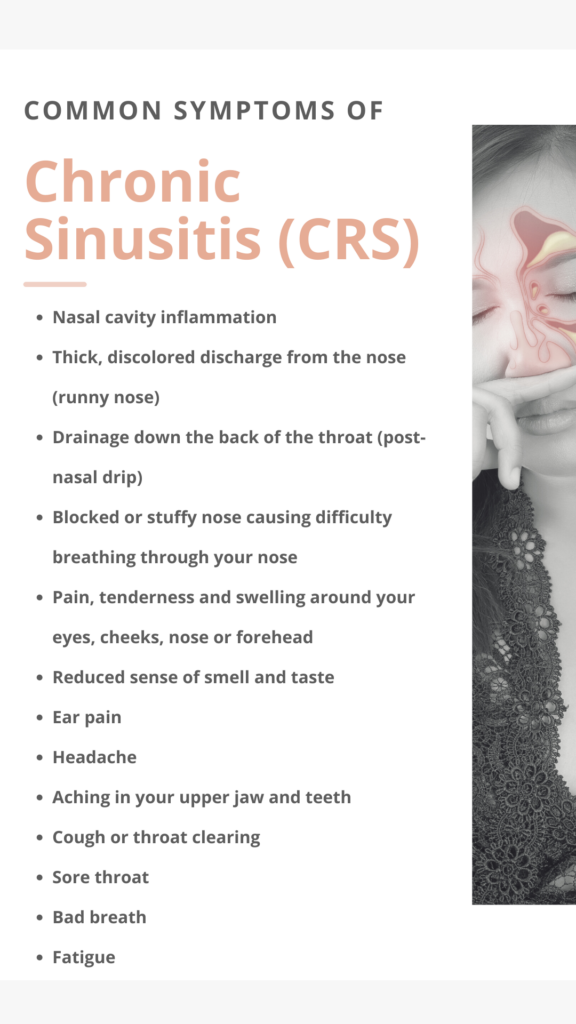
Key benefits for ION* Sinus Support:
- Cleanse gently
- Hydrate naturally
- Breathe clearly
- Microbiome-friendly
In addition to supporting your sinuses on the cellular level, ION* Sinus Support rinses away dust, pollen and airborne irritants while also hydrating your nasal passages for comfortable, efficient breathing.
ION* Sinus Support is an all natural, microbiome friendly nasal rinse for clearing dust, pollen, and other airborne environmental irritants that we’re exposed to every day.
It hydrates and soothes your nasal passages, supporting clear nasal breathing.
Product Info Ingredients: Purified Water, Humic Extract (from Ancient Soil)
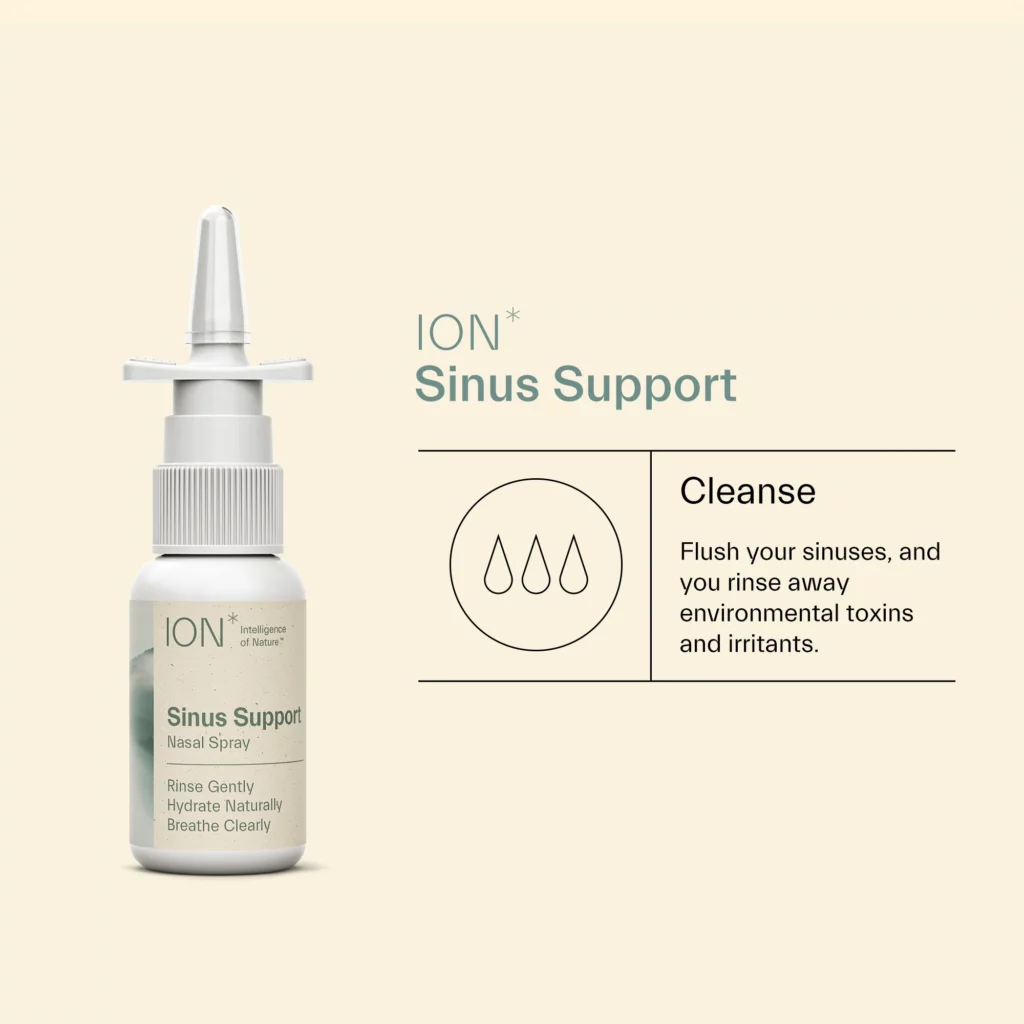
Humic Extract?
Like you, this is a foreign term to me that was almost meaningless.
So, I reached out to the ION team regarding it, and this is what they said,
ION* is comprised of humic extract and purified water. Its active ingredient, humic extract (sourced from 60myo fossilized soil), is naturally rich in a variety of trace minerals and amino acids—the trace minerals and amino acid content naturally present in the soil make up less than 1% of the formula.
In addition to third-party testing of the humic content, we run every batch through California prop testing to ensure safety and purity of the final product.
Humic extract isn’t bacteria
…but a family of molecules made by bacteria. Our balanced formula includes this unique family of carbon molecules with oxygen-binding sites that are produced by bacteria when they digest nutrients.
We extract our humic from ancient, fossilized soil, sometimes referred to as Leonardite.
When we say “humic extract” what we mean is we are literally extracting from humic substances. However, few people in fact know what humic substances are.
The term “humic substances” covers a range of complex materials that have been used to drive health in humans for thousands of years.
Humic substances are the result of the degradation of organic material and are abundant in fossilized soil layers around the world.
As plant material degrades and is compressed over millions of years, it becomes rich, organic material called Leonardite. This is the source from which we extract our active ingredient.
Our humic extract differs from other extracts of humic substances, like isolated fulvic and humic acids. To isolate fulvic and humic acid, the chemical nature of the humic substances is altered, breaking down the fossilized communication network of bacterial metabolites and thereby removing the intelligence from that rich ancient ecosystem.
The extraction process used to create ION*, however, is the only process of its kind in the world, seeking not to destroy, but to embrace that innate communicative ability.
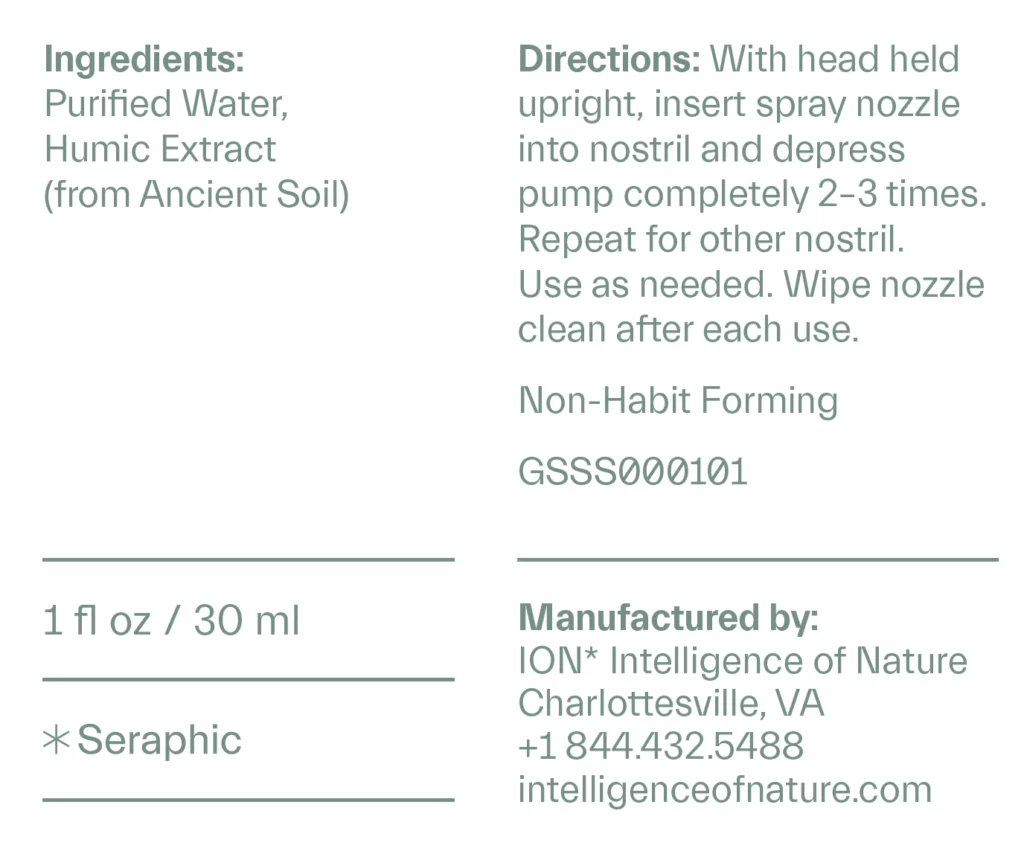
ION* Sinus is:
- vegan
- naturally gluten-free
- soy free
- sulfite-free
- non-GMO
- certified glyphosate residue free
It is produced in a facility free of allergens, including peanuts and tree nuts.
Using it is simple with the following instructions: With head held upright, insert spray nozzle into nostril and depress pump completely. Then, repeat for the other nostril. Use as needed. Wipe nozzle clean after each use.
The important thing to remember about both reflux and sinus is that they do have a microbiome component.
And remember, the microbiome is where our health – all of the true health – derives from.
If you liked this post, you might also enjoy:
- How to Achieve Optimal Microbiome Diversity
- The Secret to a Healthy Gut Microbiome
- Personal Air Purifier
Affiliate disclosure: The ION* products and links in this post are affiliates. When you purchase anything from ION*, you will save a hefty amount and I make a small commission. This is part of my business that helps keep this website afloat for me to bring you the information for free. And I’m so grateful for you. Learn more about ION* HERE.
Xox,
SKH
🤰 bloating be gone! weight loss through optimal gut health for women
💃ʜᴇᴀʟ ʏᴏᴜʀ ɢᴜᴛ. ʜᴇᴀʟ ʏᴏᴜʀ ʟɪfe.
🫶🏻 founder gutbyome.com





